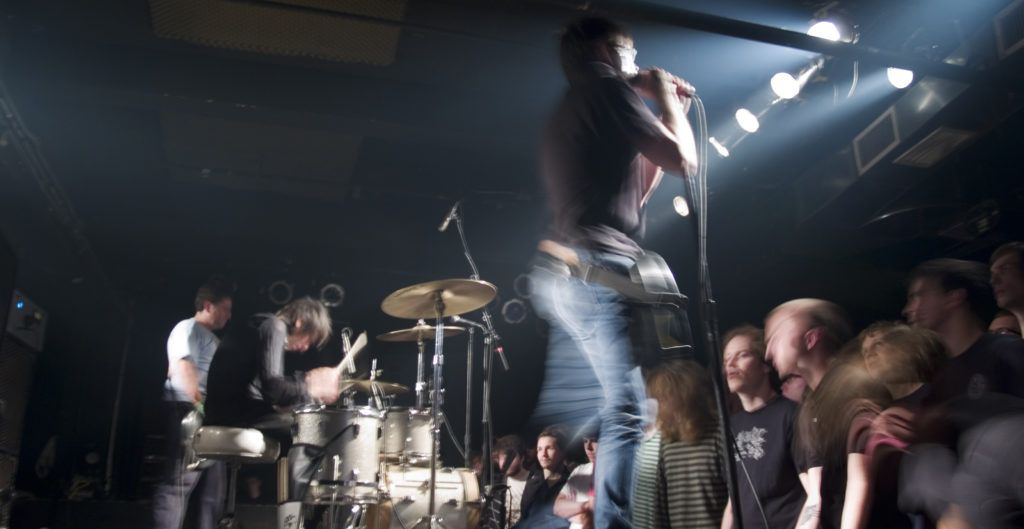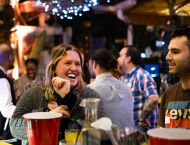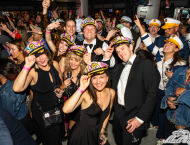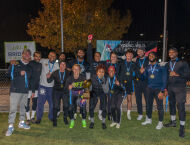Music
 Photo: Courtesy of Black Cat
Photo: Courtesy of Black Cat
The 25 Lives of Black Cat
September 1, 2018 @ 12:00am
Black Cat has sold out countless shows, with killer acts on regular rotation at the 14th Street music venue. Drawing big names like Radiohead, Yeah Yeah Yeahs, The Killers and more, the double-level DC mainstay hasn’t quit booking national tours and amplifying local bands since opening its doors in ’93.
But its biggest accomplishment since opening? Owner and founder Dante Ferrando laughs on a recent call with On Tap, offering a blunt reply.
“Managing to stay open for 25 years would be the first [accomplishment] to come to mind,” he says. “It is a tough business. There’s a lot of ups and downs. You have to constantly recreate little bits and pieces to make things work.”
Black Cat is celebrating its 25th anniversary this month with a two-night lineup on September 14 and 15 of some of the venue’s favorite bands to work with. Ferrando seems like he doesn’t want to favor any particular act, but mentions Mike Watt – who’s part of the Friday night lineup – as an example of a musician that means something to the Black Cat team.
“We had a ton of good [musicians] that we asked and a ton of good ones that we got,” Ferrando says of how he culled talent for the anniversary shows. “It’s very tough unless you really want to blow huge amounts of money to get people to change their plans. Everyone’s on tour and has different things that they’re doing.”
As the drummer for local post-hardcore band Gray Matter, opening a music venue might have seemed like an obvious interest for Ferrando – but he’s also a natural entrepreneur. He owned Dante’s, a 14th Street restaurant and emphatic supporter of DC’s music scene, before opening the Black Cat. He says 9:30 Club monopolized the punk and alt-rock scenes at the time, but Ferrando had his own vision.
In its original location on F Street from 1980 to 1996, 9:30 was a “good, tiny punk-rock dive” for a 200-person show, according to Ferrando. At the time, he saw a need for a DC venue that was more accommodating to both fans and bands performing there, like a dressing room and more space for the audience.
“We did something that was needed in the city at that point in time. It was something we needed to have.”
With some healthy competition, 9:30 Club has since moved and improved – and both venues were able to carve their own identities in the city.
“My route was definitely more of the smoky bar or traditional club, [and 9:30 Club has] more of a concert production vibe,” he says. “I think it ended up balancing nicely in the end.”
Ferrando describes their current spot as a Hail Mary; the Black Cat moved to the larger space, still on 14th Street, in 2001.
“If you came to the area now and tried to get a space this big, I would be terrified to know how much that would cost.”
In the 25 lives of Black Cat, Ferrando has witnessed some shifts in the music scene. He says their first five years were the height of indie rock, with a unified local and regional rise of independent record labels and bands feeding off each other’s energy and style.
“I like times like that. It’s great to just have a great band. But if you have four great bands that all know each other and are bouncing stuff back and forth because they’re seeing each other’s shows, those sort of environments are very exciting to me. I just haven’t seen that to quite the [same] degree recently. I always hoped for those little hotspots to pop up and there’s not much you can do to create them aside from waiting for when they start happening.”
He says the fan-musician dynamic has changed too.
“Something that I kind of miss: there used to be a time where if a band was pretty big, a member of that band [playing] with their new act would draw really well. Nowadays, nobody cares. They might like the band, but the direct relationship to the band isn’t as intense as it used to be.”
But the volume of bands and people coming out is still growing, because new listeners can learn about an up-and-coming band through a few Internet clicks. With more venues popping up, local bands play more often now than they did before – and the venues are doing really well, according to Ferrando.
His Friday night anniversary show lineup includes Des Demonas, Subhumans, Ocampo Ocampo & Watt, Ted Leo, Dagger Moon, Scanners, Honey, and Felix & Sam. Des Demonas guitarist Mark Cisneros calls the Black Cat an oasis in a changing district with new luxuries drawing people with wealth.
“The Black Cat is a home for everyone who’s still here playing music left in the scene,” Cisneros says. “It’s still a stronghold for the DC punk rock scene. It’s one of the best clubs in the world and it’s a real privilege to play there. We’re all thankful that Dante is still going with it and making a home for us.”
Ferrando’s band is set to play a couple of songs on Saturday night.
“It has nothing to do with Black Cat particularly,” he says of Gray Matter’s mini-reunion. “It’s just an opportunity for me to fly old friends in and do a show, which we haven’t done since the 20th anniversary. I’m particularly psyched about that.”
On Saturday, Ex Hex, Hurry Up featuring Kathy Foster and Westin Glass of The Thermals, Algiers, Hammered Hulls, Wanted Man, and Foul Swoops will share the stage with Ferrando.
“You get to catch some of the best local bands we’ve got and some really cool out-of-town bands too,” he says. “There’s a lot of people who’ve been coming here for a lot of years. It’s good to have just a fun party sometimes.”
Don’t miss the Black Cat’s 25th anniversary shows on Friday, September 14 and Saturday, September 15 on the venue’s mainstage. Doors at 7 p.m. both nights. Tickets are $25 per night. Learn more at www.blackcatdc.com.
Black Cat: 1811 14th St. NW, DC; 202-667-4490; www.blackcatdc.com







